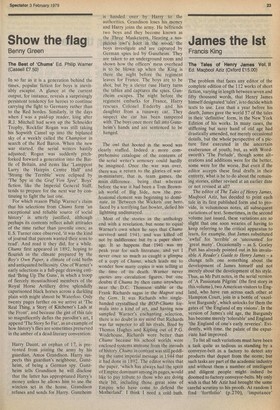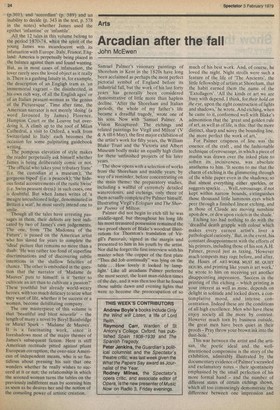James the 1st
Francis King
The Tales of -Henry James Vol. 11 Ed. Maqbool Aziz (Oxford £15.00) The problem that faces any editor of the complete edition of the 112 works of short fiction, varying in length between seven and fifty thousand words, that Henry James himself designated 'tales', is to decide which texts to use. Less than a year before his death, James gave the world 57 of the tales in their 'definitive' form, in the New York Edition of his works. In many cases, the stiffening but surer hand of old age had drastically amended, not merely occasional details, but the whole perspective of a picture first executed in the uncertain exuberance of youth; but, as with Wordsworth's 'The Prelude', though some alterations and additions were for the better, some were for the worse. But even if the editor accepts these final drafts in their entirety, what is he to do about the remaining stories, either revised at an earlier date or not revised at all?
The editor of The Tales of Henry James, Maqbool Aziz, has decided to print each tale in its first published form and to provide, in voluminous notes, all subsequent variations of text. Sometimes, in the second volume just issued, these variations are so slight that one soon wearies of having to keep referring to the critical apparatus to learn, for example, that James substituted 'awful' for 'terrible' or 'uncounted' for 'great many'. Occasionally — as S. Gorley Putt has already pointed out in his invaluable A Reader's Guide to Henry James — a change tells one something about the development of James himself and not merely about the development of his style. Thus, as Mr Putt notes, in the serial version of 'A Passionate Pilgrim' (the first story in this volume), two American visitors to England, who have run across each other at Hampton Court, join in a bottle of 'excellent Burgundy', which unlocks for them the gates of 'the England of my visions'. In the version of James's old age, the Burgundy has become merely 'tolerable' and England 'the England of one's early reveries'. Evidently, with time, the palate of the expatriate had improved.
To list all such variations must have been a task quite as tedious as standing by a conveyor-belt in a factory to detect any products that depart from the norm; but such tasks are part of the academic industry and without them a number of intelligent and diligent people might indeed be doomed to factory conveyor-belts. My only wish is that Mr Aziz had brought the same careful scrutiny to his proofs. At random I find lortfolio' (p.2'70), impotance' (p.301), and 'accordian' (p. 389) and an inability to decide (p. 343 in the text, p. 578 in the notes) whether James used the epithet Infantine' or 'infantile'.
All the 12 tales in this volume belong to the period 1870-74, when the spirit of the young James was incandescent with its infatuation with Europe. Italy, France, England: America is perpetually being placed in the balance against them and found wanting. But, as in most cases of infatuation, the lover rarely sees the loved object as it really is. There is a gushing fatuity in, for example, the description of an Engligh tram as 'an immemorial vagrant — the disinherited, in his own rich way, of all the English ages' or of an Italian peasant-woman as 'the genius of the Picturesque'. Time after time, the American narrator is not merely 'doing' (a word favoured by James) Florence, Hampton Court or the Louvre but overdoing it. A climb up to the roof of Milan Cathedral, a visit to Oxford, a walk from Switzerland to Italy: each becomes the occasion for some palpitating guidebook writing.
The pompous elevation of style makes the reader perpetually ask himself whether James is being deliberately comic or not. 'The official who takes your tributary franc' (i.e. the custodian at a museum); 'the gorgeous biped' (i.e. a peacock); 'the hideous festal accoutrements of the rustic Swiss' (i.e. Swiss peasant dress): in such cases, one is doubtful. But when James writes of 'a meagre uncushioned ledge, denominated in Britain a seat', he must surely intend one to smile.
Though all the tales have arresting passages in them, their defects are best indicated by two of James's own judgements. The one, from 'The Madonna of the Future', is passed on the American artist who has slaved for years to complete the 'ideal' picture that remains no more than a daub: 'He was rather too fond of superfine discriminations and of discovering subtle intentions in the shallow felicities of chance.' The other is embodied in the question that the narrator of 'Madame de Mauves' puts to himself: is it 'better to cultivate an art than to cultivate a passion?' These youthful but already world-weary heroes, with too much delicacy to seize what they want of life, whether it be success or a woman, become debilitating company.
The one masterpiece of this volume is that 'beautiful and blest nouvelle' — the length of many a novel by Beryl Bainbridge or Muriel Spark — 'Madame de Mauves'. It is a fascinating work, since it foreshadows most of the major themes of James's subsequent fiction. Here is stiff American rectitude pitted against pliant European corruption; the over-nice American of independent means, who is so fastidious about pressing his suit that one wonders whether he really wishes to succeed at it or not; the relationship in which the scorned woman turns the tables on the previously indifferent man by scorning him as soon as he desires her and the notion of the consoling power of artistic creation.



































 Previous page
Previous page